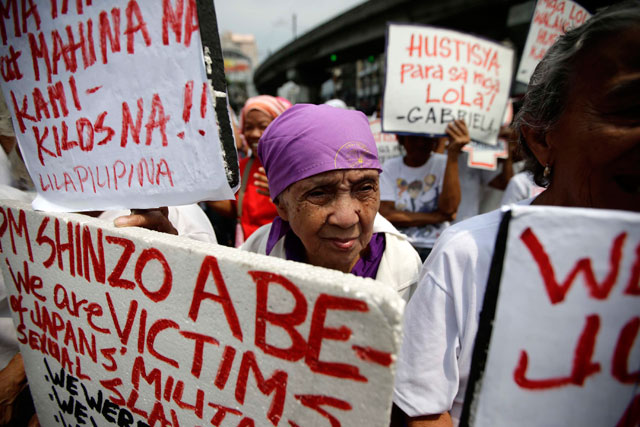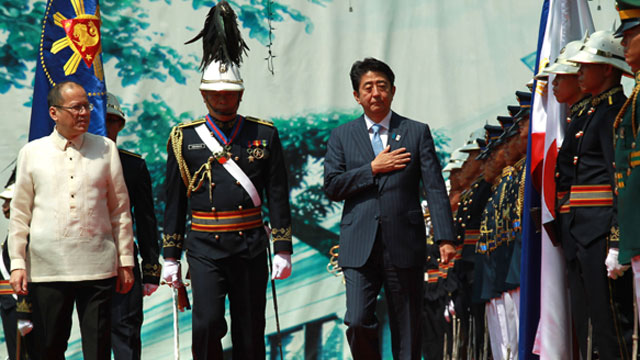SUMMARY
This is AI generated summarization, which may have errors. For context, always refer to the full article.

MANILA, Philippines – While the President suggested the Philippines has moved on from its historic conflict with Japan, “comfort women” said they have not.
President Benigno Aquino III, in his toast during the state luncheon in honor of visiting Japanese Prime Minister Shinzo Abe on Saturday, July 27, said: “Mr Prime Minister, the relations between our countries have been extensive and historic. After overcoming conflict, we have developed both a strong alliance and a deep friendship.”
Outside the Palace gates, a group of comfort women were still crying for justice. “PM Shinzo Abe, we are victims of Japan’s military’s sexual slavery,” the women lamented.
At least 200,000 Asian victims, including Filipino women and girls, were believed to have been forced into sexual slavery by the Japanese military during World War II in what was termed as “comfort stations.” Survivors and their families have been demanding an official apology and legal redress from Japan.
“Mahina at matanda na kami. Kilos na!” a placard read. (We’re weak and old. Act now!)
Apology
US-based Filipina author M. Evelina Galang, who has written extensively on the plight of Filipina comfort women, lamented that Aquino and Abe did not include the issue in their agenda.
“PNoy is a nice man, but like Gloria Macapagal-Arroyo and Erap Estrada, he has yet to acknowledge and honor and support the women of his nation, the lolas (grandmothers),” Galang told Rappler.
“People should know that the comfort women standing at the gates must now be in their late 80s and 90s protesting. Many have died,” Galang added.
She noted that in Korea, the comfort women are recognized, honored, and supported by their own government.
“It took the women 50 years to step forward and tell their stories. Their demands are simple: They want Japan to make a formal apology to the women and their families. They want violence against women to end. They want justice,” Galang said.
The writer recently completed her soon to be published book, “Lola’s House: Women Living with War,” which chronicles stories of 15 Filipina comfort women.
No evidence of sexual slavery?
Japan refuses to recognize its historical responsibility for the lmperial Armed Force’s coercion of young women into sexual slavery during its colonial and wartime occupation of Asia and the Pacific Islands.
In 2007, Abe made a controversial statement that deviated from the widely accepted historical account of Japanese wartime atrocities.
“There was no evidence to prove there was coercion as initially suggested. That largely changes what constitutes the definition of coercion, and we have to take it from there,” Abe said.
Former Japanese Prime Minister Junichiro Koizumi earlier wrote a personal letter apologizing to the comfort women. In 2002, he said that the involvement of the Japanese military in the issue of comfort women during the war was “a grave affront to the honor and dignity of large numbers of women.”
But Galang insisted that what the comfort women and their advocates want is the Japanese government’s acknowledgment and apology.
“A personal apology is not the same thing as legislation from the Japanese government declaring their remorse over these crimes against humanity,” Galang said.
Galang, considered one of the 100 most influential Filipinas in the US, advocated for the passage of House Resolution 121, the US Congressional Bill that asks Japan to make a formal apology.

Strategic partnership
The Philippine Department of Foreign Affairs in previous statements emphasized the “importance of adhering to the language and tone” of Koizumi’s apology.
READ: PH: Be cautious on ‘comfort women’ issues
But Aquino did not delve into the issue that has haunted the country and comfort women for years since the war ended.
“Moving forward, the Philippines fully intends to deepen our relationship with Japan so that we may bequeath to younger generations a legacy of prosperity, peace and productive solidarity between our countries,” Aquino said.
Aquino’s Japanese counterpart vowed to strength the strategic partnership of the two countries, pledging to help boost the Philippines’ maritime security and to extend other forms of aid.
READ: Japan PM’s visit to PH: ‘Image-building’ – Rappler.com
Add a comment
How does this make you feel?
There are no comments yet. Add your comment to start the conversation.